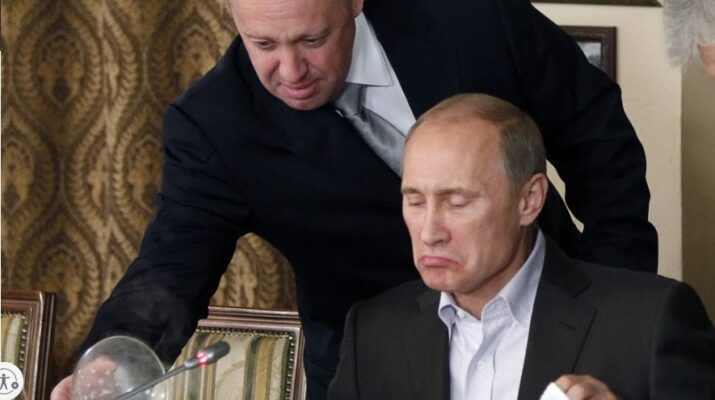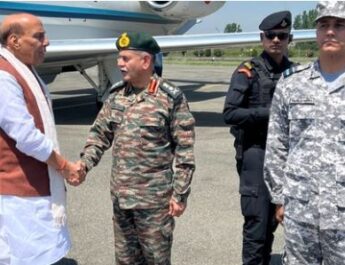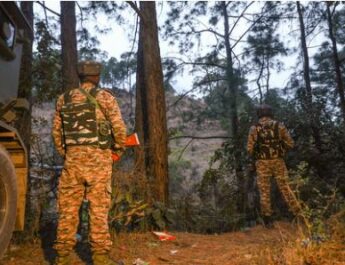In a shocking turn of events, Mercenary leader Yevgeny Prigozhin, who led a brief armed rebellion against Russia’s military leadership in June, was killed in a plane crash on Wednesday. Yevgeny Prigozhin, the mastermind behind Russia’s notorious private military company Wagner Group, was tragically killed in a plane crash near Moscow. Prigozhin’s death comes just two months after he led a failed mutiny against the top brass of the Russian army, raising questions about the future of his mercenary operations and sparking intense speculation about the circumstances surrounding his demise. Russian President Vladimir Putin, in a televised address, vowed to punish those behind the rebellion, calling it “betrayal” and “treason.”
US: Biden ‘not surprised’
President Joe Biden says he was “not surprised” at news that Prigozhin may have died in a plane crash in Russia.
“I don’t know for a fact what happened, but I’m not surprised,” Biden said, adding, “There’s not much that happens in Russia that Putin’s not behind. But I don’t know enough to know the answer.”
France: ‘Reasonable doubts’ over Prigozhin plane crash
Paris said that there were “reasonable doubts” about the cause of the plane crash that presumably killed Prigozhin.
“We don’t yet know the circumstances of this crash. We can have some reasonable doubts,” government spokesman Olivier Veran told France 2 television.
Asked about US President Joe Biden’s comments, Veran agreed that “as a general rule, that’s a truth that can be established”.
Ukraine: ‘Worth waiting for the fog of war to clear
Presidential aide Mykhaylo Podolyak wrote on social media the crash of the plane was a signal from the Kremlin to anyone who showed disloyalty but that it was worth waiting for the “fog of war” to clear before making concrete conclusions.
“The demonstrative elimination of Prigozhin and the Wagner command two months after the coup attempt is a signal from Putin to Russia’s elites ahead of the 2024 elections. ‘Beware! Disloyalty equals death’”, Podolyak wrote.
Estonia: Putin will ‘eliminate opponents’
Estonia Prime Minister Kaja Kallas, in an interview with CNN, said Putin will “eliminate opponents, and that scares anyone who is thinking of expressing an opinion different than his”.
Poland: Putin’s opponents ‘do not die naturally’
Polish foreign minister Zbigniew Rau told state news channel TVP Info, “We would have great trouble naming anyone who would intuitively think this was a coincidence. It so happens that political opponents whom Vladimir Putin considers a threat to his power do not die naturally.”
UK: ‘Avoid jumping to conclusions’
Schools minister Nick Gibb says the government must “avoid jumping to conclusions” over the plane crash in Russia that reportedly killed Wagner chief Yevgeny Prigozhin.
He said the government is monitoring the situation closely and working with its allies.
“I can’t go any further at the moment,” he added. “But of course, the government will have more to say once our assessment of it has happened, and conversations with allies reach clear conclusions.”
Germany: ‘No quick conclusions can be drawn’
German Foreign Minister Annalena Baerbock has warned against speculation over the crash of the plane which authorities said was carrying Wagner mercenary chief Yevgeny Prigozhin.
“No quick conclusions can be drawn,” she told Deutschlandfunk radio on Thursday.
However, she said, the incident underscores “that a system, that a power, that a dictatorship that is built on violence, will also only recognize violence internally.”
Sweden: ‘Unclear’ what the crash means for Russia
Sweden’s foreign minister, Tobias Billstrom, stated that it remained “unclear” what the crash meant for Russia and the war in Ukraine.
He added that Sweden and its international partners were following the incident closely.
Mysterious Plane Crash Claims Prigozhin’s Life:
On a fateful evening, a plane carrying Yevgeny Prigozhin and his right-hand man Dmitry Utkin, known as “Wagner,” crashed with no survivors. The incident adds another layer of intrigue to Prigozhin’s controversial legacy. The Russian aviation agency, Rosaviatsia, released the names of the 10 individuals aboard, confirming Prigozhin’s presence on the doomed flight.
Wagner Group’s Fate Uncertain:
Yevgeny Prigozhin’s death throws the Wagner Group into disarray. The private military company, known for its involvement in conflicts across Africa and Eastern Europe, faced Putin’s ire earlier when it attempted a mutiny against the Russian army’s leadership. With Prigozhin gone, the future of the Wagner Group hangs in the balance, leaving observers to wonder about the fate of its operations in various regions.
Speculation and Controversy Surrounding Prigozhin’s Demise:
Amid the lack of concrete information, speculation runs rampant regarding the circumstances of Prigozhin’s death. Some of his supporters point fingers at the Russian state, while others suggest Ukraine’s involvement, given the proximity of the incident to Ukraine’s Independence Day. A Telegram channel linked to Wagner referred to Prigozhin as a hero and patriot who fell victim to unidentified traitors.
A Complex Legacy: From Convict to Kremlin Confidante:
Yevgeny Prigozhin’s journey from a former convict to a close associate of Russia’s leader Vladimir Putin is a story marked by twists and turns. Starting as a hot dog vendor, he gradually built a catering empire in St. Petersburg, leveraging his connections to win lucrative government contracts. His role in founding the Wagner Group and his influence in various conflicts further cemented his status, even as his actions garnered interest international attention and controversy.
Global Reach and Infamy: From Ukraine to Africa:
Prigozhin’s influence extended well beyond Russia’s borders. He played a key role in supporting pro-Russian uprisings in Ukraine and was instrumental in deploying Wagner fighters to Syria. Prigozhin’s reach expanded to Africa, where his private military company provided security services to gain access to valuable mineral resources. His tactics aligned with Kremlin goals, but his actions attracted notoriety, including his indictment in the United States for his alleged involvement in election interference.

Clashes and Nationalist Appeal: A Complicated Legacy:
In his later years, Yevgeny Prigozhin’s relationship with Russia’s military leadership soured. He criticized army chiefs for their handling of the invasion in Ukraine, earning him a following among nationalist sentiments in Russia. His outspokenness on social media garnered attention and followers, further complicating his legacy as a controversial figure with shifting allegiances. The demise of Yevgeny Prigozhin marks the end of a complex and enigmatic chapter in Russian history. As investigations into the plane crash continue, the impact of his absence on the Wagner Group and Russia’s geopolitical landscape remains to be seen.




